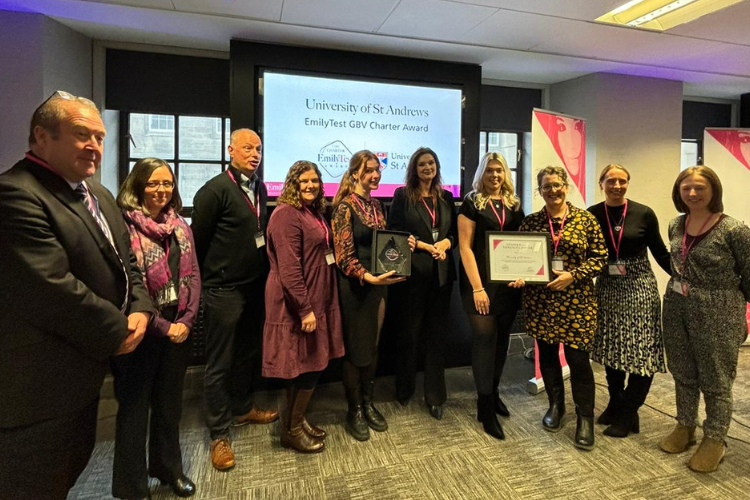St Andrews first university to receive Gender-Based Violence Charter Award

The University of St Andrews has become the first university in the UK to receive the EmilyTest Gender-Based Violence Charter Award.
Developed by pioneering charity EmilyTest, the Charter Award equips the University with a hallmark that demonstrates its commitment to achieving a campus that is responsible in tackling gender-based violence (GBV).
The University was presented with the award in Glasgow today (Wednesday 22 November) by the Scottish Minister for Higher and Further Education, Graeme Dey, and EmilyTest founder and CEO, Fiona Drouet MBE.
The inaugural awards form part of the charity’s third annual conference, bringing together keynote speakers and leading academics from across the United Kingdom.
The University of St Andrews and South Lanarkshire College are the first institutions to successfully complete the extensive GBV programme and achieve chartered status.
The University’s GBV policies, practices and procedures were assessed by a trained independent panel following significant undertakings from staff and students in the bid to achieve accreditation.
Professor Dame Sally Mapstone, Principal and Vice-Chancellor of the University of St Andrews, said: “The awarding of the EmilyTest Charter is both a culmination and a recognition of a great deal of hard work by colleagues and students to counter gender-based violence in all its forms. It is also just the beginning, as we seek to maintain and enhance the progress we are making.
“Achieving the charter and becoming the first university in the UK to do so has been a true team endeavour, and I am grateful to everyone who has contributed to and focused on this extremely important work.”
The Charter, the first of its kind in the world, is entirely evidence-based and aims to ensure institutions are as safe as possible in preventing and addressing GBV on their campuses, helping students to live, work and study free from the harms and threats of GBV.
Fiona Drouet MBE said: “We are absolutely delighted to see the University of St Andrews and South Lanarkshire College being awarded today.
“The time and commitment they have invested in achieving Charter status is truly exceptional. No words can express my gratitude and admiration for all the staff and students who have supported and continue to support this life-saving work.
“Being awarded with the Charter exemplifies a university or college that takes gender-based-violence seriously. It shows they are committed to working towards a safer campus but also understand the importance, for students and staff, of quality-assuring their efforts.
“The Charter not only acts as an internal marker of achievement but an external one too, helping to ensure students and their families can make an informed choice when it comes to their place of study. I believe if it had existed when my daughter Emily was at university, she might still be alive today.
“Our charity has seen incredible enthusiasm and dedication from our charter institutions and many others are working towards obtaining that hallmark. We hope it won’t be long before all universities and colleges across the country follow suit.”
Fiona set up EmilyTest after her daughter Emily, an 18-year-old undergraduate law student, took her own life after being subjected to a sustained campaign of abuse at the hands of a fellow student.
Recognising the many failings in Emily’s case, her family set up EmilyTest. The charity focuses on tackling gender-based violence in education and, alongside the Charter, has developed training programmes and a risk assessment, helping to ensure universities and colleges have the skills, training and resources needed to keep students safe. Ultimately, the Charter aims to ensure that no other student suffers the same fate as Emily.
The EmilyTest GBV programme is supported and funded by the Scottish Government and the National Lottery Community Fund and is in the process of expanding into England, where institutions have been impressed by the inspiring work of EmilyTest in Scotland.
Issued by the University of St Andrews Communications Office.